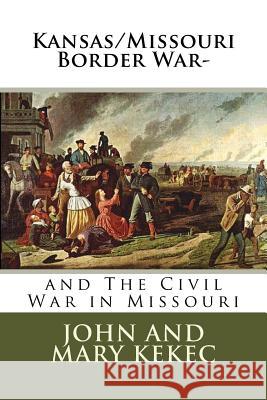The Kansas/Missouri Border War-: and The Civil War in Missouri » książka
The Kansas/Missouri Border War-: and The Civil War in Missouri
ISBN-13: 9781523855926 / Angielski / Miękka / 2016 / 162 str.
This story is about two pioneer families that migrated west from North Carolina and Pennsylvania, and then came together in southeastern Kansas Territory just in time to be caught up right in the middle of the Kansas/Missouri Border War and the Civil War campaign that followed. The Border War began in the mid 1850's and actually lasted throughout the Civil War years of 1861 to 1865. The Kansas-Nebraska Act of 1854 had opened up the land to legal settlement, but it allowed the residents of these territories to decide by popular vote whether the state would be a slave or free state, and that was the root of the resulting turbulence. The Border War pitted the pro slavery group against the abolitionist free-staters This situation soon led to organized guerilla-type raids followed by still more raids of retribution in retaliation. There was incessant pillaging, burnings, shootings, looting, and hangings throughout the long period of unrest and such dispirited cries rang out from the terror-stricken neighbors as, "The shot my husband and oldest son...," "they burned our cabin and crops ...," "they stole all of our horses and other livestock ...," "they set the whole prairie on fire ...," and "they sacked the town and then burned it down." Through these turbulent times the Little and Williams families were quite active in business and political affairs both locally in Bourbon, County as well as at the more prominent centers around the territory then before statehood. There were doctors, merchants, judges, territorial legislature representatives, lawyers, newspapermen, and a U.S. Marshall in the families. The violence along the border only escalated with the beginning of the Civil War in Missouri in the spring of 1861. It didn't take the federal troops out of St. Louis long to run the Confederate-leaning state government out of central Missouri and across and down along the Kansas border to northwest Arkansas. The Battle of Carthage occurred along there on July 5, 1861. This engagement was still eleven days before the first Battle of Bull Run of the eastern campaign. The battle at Carthage was only the prelude to the big Battle of Wilson's Creek near Springfield that soon followed and the subsequent big Battle of Pea Ridge early the following year. The Civil War west of the Mississippi is referred to as the Trans-Mississippi Campaign, which included primarily the campaign in Missouri, but also in Arkansas, Louisiana, Texas, and the action all along the Mississippi River. Many of the Little and Williams family members served in some of these engagements and other skirmishes around the state. History comes alive for us as it is seen through the eyes of actual exemplary family characters whose lives were integrally immersed in these major events of our American History. This type of story-telling also interjects the human characteristics and emotions with both the highs and lows of their proud accomplishments including the hardships and heartaches of the vulnerable victims. This new Our American Heritage series takes a genealogy approach in presenting our American History. This different look at our past through the eyes of some of our ancestors affords a more personal touch that results in more lasting impressions and a deeper understanding not usually garnered through the reading of textbooks. Images of ancestors engaged in the associated historic events are enabled to be brought into sharper focus from their often fuzzy obscurity. Such historic accounts in our ancestor's lives are intertwined and are all integrally wrapped up together in our American History, and we should know them both better than just the cursory impression gained from a smile in a faded photograph or a few memorized dates concerning some long ago historic events. Some of these ancestor generations were born in a special era with a unique set of circumstances and challenges as fate's chosen destiny for them, and whose experiences are a part of our great American h
Zawartość książki może nie spełniać oczekiwań – reklamacje nie obejmują treści, która mogła nie być redakcyjnie ani merytorycznie opracowana.











